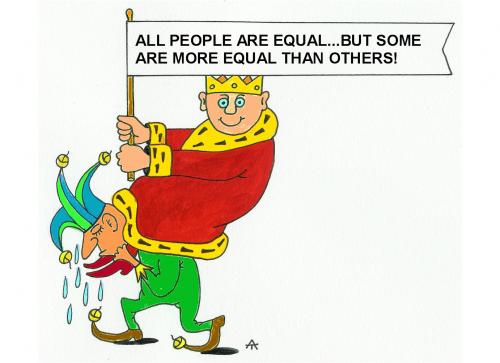As we all know, Canada is indeed a multicultural mosaic of people who come from all over the world. In a diverse country such as Canada, I’m sure that there are many people, such as immigrants and refugees, who strongly want to believe that someday, discrimination and racism will no longer exist. In a social democratic state, they believe that achieving equality, freedom, and collectivism will reduce these inequalities as it decreases isolation and increases social cohesion. Their ideal goal is to achieve equality of condition for all. Social democrats believe that freedom ranks with equality in terms of values but, unless equality is attained, freedom or collectivism cannot exist (Mullaly, 2007). My question is however, can achieving the equality of condition really diminish prejudice and discrimination towards immigrants and refugees, and allow them to feel truly included in society?
According to Mullaly, Social democrats believe that “[narrowing] the gap as much as possible between [the] rich and poor” will enable everyone to attain equality of condition. Doing so allows both immigrants and refugees, and citizens to have the same economic resources and have the same opportunities. With that being said, no one is greater than the other in terms of wealth and influence. This gives citizens and non-citizens the same freedom to have more control of the choices in their lives. Eliminating social class in terms of who is rich and who is poor, also allows for social cohesiveness, as it encourages cooperation for the good of the community rather than competition between individuals for power (Mullaly, 2007).
On the other hand, although poverty for immigrants is an issue that should be addressed, eliminating it may not completely achieve social inclusion, “especially if the offered solutions take the form of simple income re-distribution programs” (Howard, 2003). Howard (2003) also states that “breaking down poverty according to ethnic groupings can lead us to conclude that a society might be excluding members of specific groups, thus setting up a division of “us” and them” along ethnic and racial lines”. Therefore, judging who is in poverty due to their ethnicity and race still promotes social exclusion rather than social inclusion in society. This proves that even if equality of condition is achieved, many immigrants and refugees are still prone to experience feelings of isolation. If immigrants and refugees are discriminated because of their race, culture, gender, and sexuality, they are deprived of the freedom to be themselves, as they may be forced to make choices they feel are more “socially acceptable” to avoid alienation. Furthermore, this can also affect the social democratic belief in collectivism as it begins with an individual’s willingness to cooperate within the group. Thus, if immigrants or refugees feel isolated in a group, there could still be a power struggle between them and citizens, making it more of a competition rather than a strong, cohesive group. Yes, they may be standing on the same end of the economic scale, but there are still many stigmas about immigrants and refugees that will cause them to be judged and scrutinized by others.
Someday many immigrants and refugees, including myself, want live in a place where they can just be themselves and still feel like a part of society, no matter what race, culture, gender, or sexuality a person represents. Essentially, a “society that is socially inclusive is a society that grants access to everyone to the vehicles of the good life” (Howard, 2003). Because of the social democratic belief in equality of condition, everyone – including immigrants and refugees – are indeed granted access to the “good life”. However, I don’t believe that reducing the differences between social classes will completely dissolve the issues of racism and discrimination towards immigrants and refugees. Personally, I love the fact that the social democrats draw so much focus and attention to equality for all, but unfortunately not everyone wants to see themselves as equals in society; there are many people who will always feel superior to other and will personally go out of their way to make people feel unwelcome. Ultimately, social democratic beliefs by definition, will lead us to a socially inclusive society, but due to cultural differences, immigrants and refugees can still feel like outcasts in society.
- Adrienne A.
References
Howard, D. (2003). "Social inclusion, social capital, and immigration". Canadian Issues. Retrieved on October 26, 2011: http://proxycheck.lib.umanitoba.ca.proxy1.lib.umanitoba.ca/libraries/online/proxy.php?http://proquest.umi.com.proxy1.lib.umanitoba.ca/pqdweb?did=509713671&Fmt=3&clientId=12305&RQT=309&VName=PQD
Mullay, B. (2007). The New Structural Social Work. Canada: Oxford University Press Canada.

Very thought provoking! I really like your reflection about how "equality of condition" appears to be framed in primarily economic terms. I never noticed that before! Although social democracy does promote a fully inclusive society at every level, it is true that this concept does not really reflect issues such as racism, heterosexism, etc. Well done!
ReplyDelete